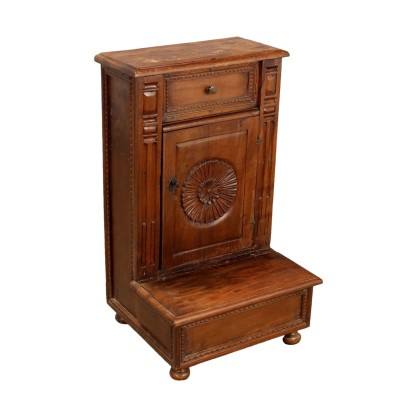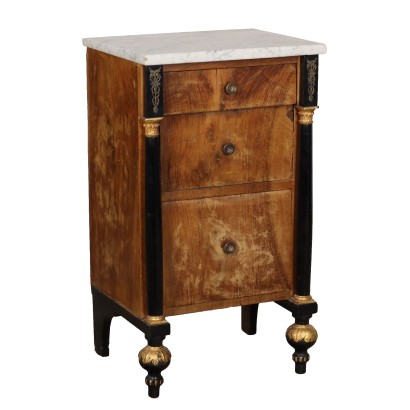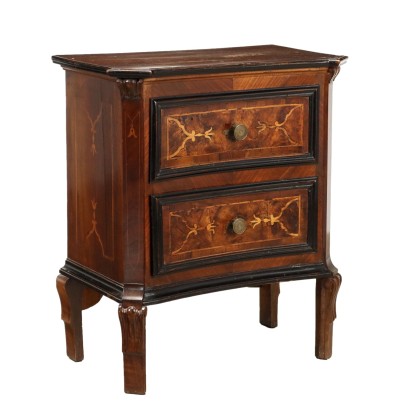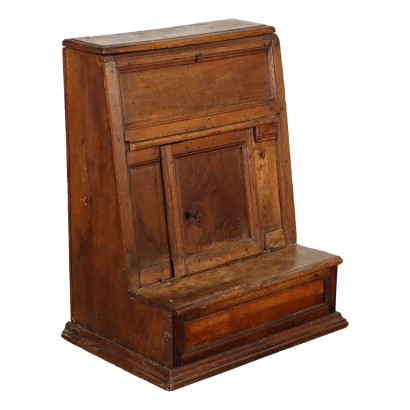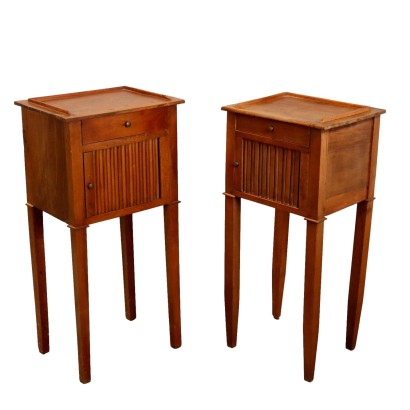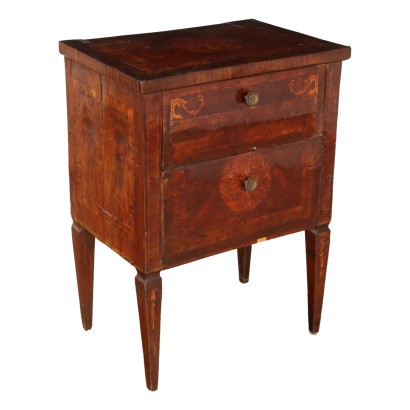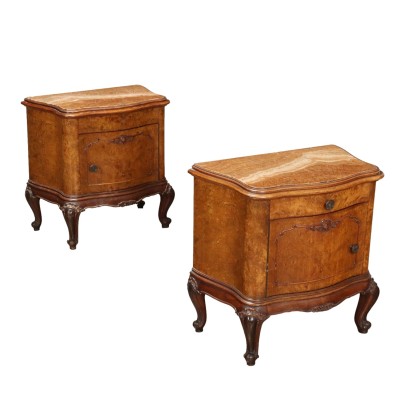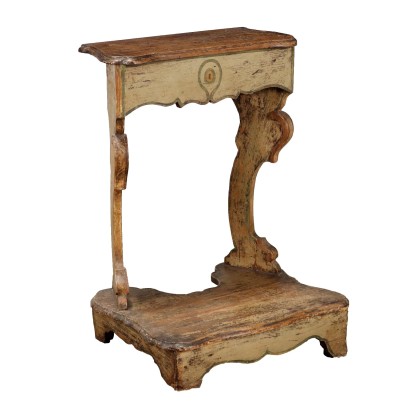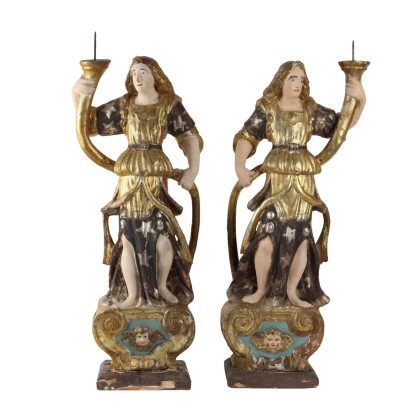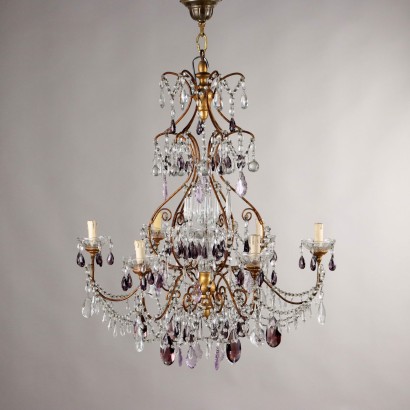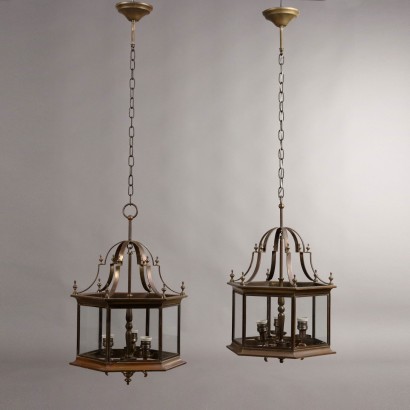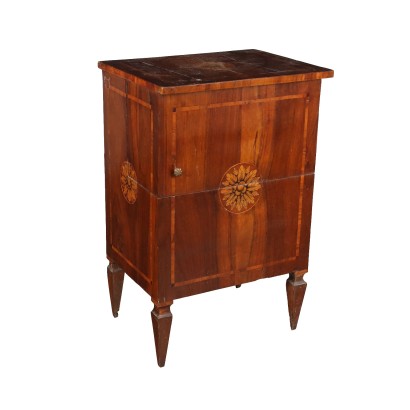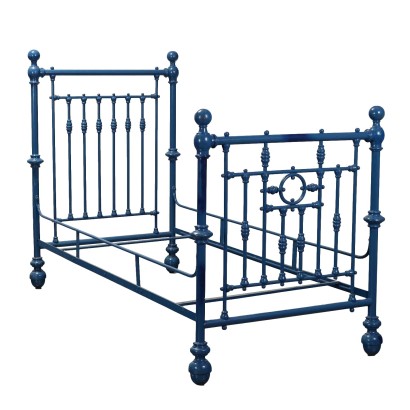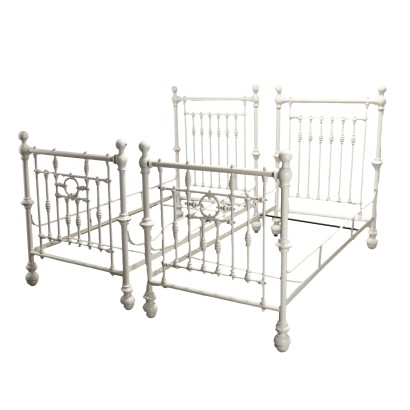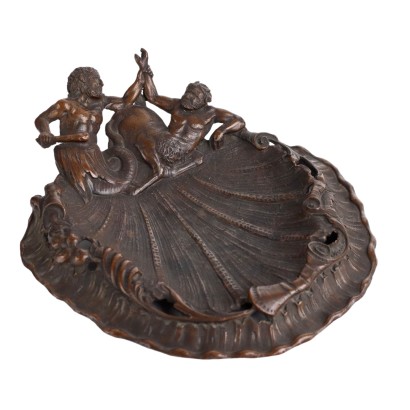Antique Praying Desk Walnut Chestnut Italy XVIII Century - Central Italy, Early XVIII Century
Features
Central Italy, Early XVIII Century
Age: 18th Century / 1701 - 1800
Origin: Central Italy
Main essence: Chestnut , Walnut
Material: Carved Wood
Description
Walnut praying desk, central Italy, first quarter of the 18th century. Front with drawer under the top, door and opening compartment, turned feet. Decorated with classical carvings, such as Greek frets, rough edges and a rosette placed in the center of the door. Chestnut interior. Lock replaced.
Product Condition:
Product that due to age and wear requires restoration and polishing. We try to present the real condition of the furniture as completely as possible with the photos. If some details are not clear from the photos, what is reported in the description is valid.
Dimensions (cm):
Height: 90
Width: 53
Depth: 49,5
Additional Information
Age: 18th Century / 1701 - 1800
18th Century / 1701 - 1800Main essence:
Chestnut
It is a hard, yellow-white wood, mostly used for rustic furniture. Since the Middle Ages it has been used in Europe, mainly in Spain, France and Italy. Particularly resistant, it was sometimes used to manufacture the supporting structures of fine furniture. It tends to darken over time and has good resistance to woodworms.Walnut
Walnut wood comes from the plant whose botanical name is juglans regia , probably originally from the East but very common in Europe. Light or dark brown in color, it is a hard wood with a beautiful grain, widely used in antique furniture. It was the main essence in Italy throughout the Renaissance and later had a good diffusion in Europe, especially in England, until the advent of mahogany. It was used for solid wood furniture and sometimes carvings and inlays, its only big limitation is that it suffers a lot from woodworm. In France it was widely used more than anything else in the provinces. In the second half of the eighteenth century its use decreased significantly because mahogany and other exotic woods were preferred.Material: Carved Wood
Other customers have searched:
Comodino, mobile da camera, cassettiera..
Approfondimenti
Per approfondire:
Mobile portaoggetti, Inghilterra inizio XIX secolo
Uno stipo toscano a cavallo tra XVI e XVII secolo
Comò Luigi XVI attribuito a Giuseppe Viglione, Torino, fine XVIII secolo
Coppia di comò e comodino della bottega Maggiolini, 1804 ca.
Un mobile comune dalla forme inusuali
Conoscere lo stile impero
Sull'antiquariato in generale dai un'occhiata anche a
Classic Monday: da un pezzo dei nostri magazzini alla storia dell'antiquariato
L'antiquariato dalla A alla Z: il Dizionario dell'Antiquariato
Il dizionario dell'antiquariato - Lastronatura
Il dizionario dell'antiquariato - Mascherone
Il dizionario dell'antiquariato - Natura morta
Il dizionario dell'antiquariato - Opificio
Il dizionario dell'antiquariato - Pastiglia
Il dizionario dell'antiquariato - Savonarola
Il dizionario dell'antiquariato - Rosone
Approfondimenti
Per approfondire:Mobile portaoggetti, Inghilterra inizio XIX secolo
Uno stipo toscano a cavallo tra XVI e XVII secolo
Comò Luigi XVI attribuito a Giuseppe Viglione, Torino, fine XVIII secolo
Coppia di comò e comodino della bottega Maggiolini, 1804 ca.
Un mobile comune dalla forme inusuali
Conoscere lo stile impero
Sull'antiquariato in generale dai un'occhiata anche a
Classic Monday: da un pezzo dei nostri magazzini alla storia dell'antiquariato
L'antiquariato dalla A alla Z: il Dizionario dell'Antiquariato
Il dizionario dell'antiquariato - Lastronatura
Il dizionario dell'antiquariato - Mascherone
Il dizionario dell'antiquariato - Natura morta
Il dizionario dell'antiquariato - Opificio
Il dizionario dell'antiquariato - Pastiglia
Il dizionario dell'antiquariato - Savonarola
Il dizionario dell'antiquariato - Rosone
Product availability
The product can be seen at Cambiago
Immediate availability
Ready for delivery within 2 working days from ordering the product.



